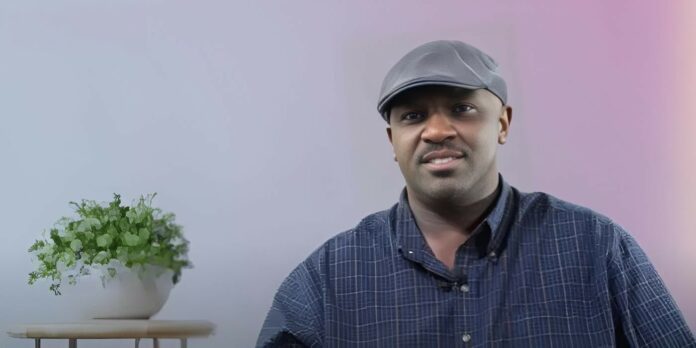Our greatest glory is not in failing, but in rising every time we fail. These are the words of Chinese philosopher Confucius and are well manifested in the life of Levi Kones.
Levi Kones had it all back in the day. He’s best known for becoming a Slim Possible finalist where he proposed to his wife on live TV and a cancer survivor. His young self was chaotic and extremely dramatic. Youth is bliss, eh?
Levi Kones works as a TV Host at KASS FM international and is the author of the inspirational book There’s no Useless Experience.
Speaking in an interview, Levi gave a story of how he went from earning millions in the US, to being deported to Kenya with absolutely nothing. He narrates his lessons from the ‘University of Life’.
Levi comes from a staunch Christian family. All children were brought up with strict principles and moral values. However, there’s always a black sheep.
Levi painted a picture of his rebellious nature throughout his childhood, which caused a rift between him and his father.
In Form one first term, Levi was suspended from high school. A letter was sent to his father, whom he and his sister had nicknamed ‘Saddam’, after Iraq’s 5th dictator president.
“This was the beginning of a major division between my dad and I. By that time, he was really disappointed in me. My dad came to school and volunteered to cane me in front of the whole assembly. This didn’t improve the relations between us,” he said.
Onwards, Levi veered away from anything his father advocated for including Christianity and CU where his dad used to preach often. He says that his father could have handled the situation better than he did.
He completed his national exams and failed to meet the university cut-off mark. His father enrolled him at KMTC for clinical medicine where he dropped out two years later, to pursue Shipping Management. This also didn’t work out well and he quit school.
In his 20s, he used his parent’s Nairobi home to throw house parties. A while later, Levi got the opportunity to turn his life around. He got a visa to travel to US to study Sports Medicine in Kansas, where his sister lived.
Like the party animal he was, Levi left Kenya while drunk and sobered up on a connecting flight in France.
In US, he enrolled in a work-study program. He recalls that he did many jobs to supplement off-season jobs. Jobs were plenty and Levi was looking for one permanent well-paying job.
“All this was to get the make-or-break opportunity. Fortunately, I got a job as a territory sales manager at a global company,” he says
He landed a job at Cocacola. The job was hefty in terms of salaries and allowances. It came with a company van, unlimited fuel and remote working benefits.
Levi slowly started living the American dream as this new job financed a lavish lifestyle. From buying a BMW to living in a condo that he paid Sh. 210,000 weekly rent ($1700).
Later on, he would have to quit this job and flee Kansas State, after the company required that he produce proof of US citizenship. By US law, he was committing a Federal Crime by working full-time without either US citizenship or a valid passport.
READ: Kenyan pastor in US making millions from Kajiado onion farm, Los Angeles businesses
Kones fled for Atalanta, Georgia where he found himself bunking with two Kenyan friends. A new leaf?
He got a job as a petrol station attendant, whose salary was just a fraction of what he used to earn at CocaCola. A while later he moved to Chicago and worked several jobs in big companies such as Motorolla and the Chicago tribune.
Kones wanted to move back to his sister’s place in Kansas State. Before setting off on the journey, he decided to first visit his girlfriend who lived in Winona, Minnesota. While with the girlfriend, they both had a heated argument about Levi’s behavior of writing bad checks.
He decided to leave and drive all the way to his sister’s in Kansas. On the way, Levi felt exhausted. He spotted a motel. “I had actually passed the motel. I turned back and went inside,” he said. He searched for his driver’s license but for some reason, he couldn’t trace it. He decided to use his passport instead, oblivious that it had expired.

At the motel, the reception attendant noticed that his passport had expired. He set him up.
“This was just after the 9/11 bombing in the US, and most Americans were suspicious of foreigners,” said Levi. The receptionist allowed him to take a room. As soon as he got into the room and slept, the attendant called the Immigration department, starting the chain of events for his deportation.
“I was woken up by loud bangs as the police and immigration officers broke in to arrest me. I knew right there and then that my goose was cooked,” he said.
Levi was arrested and taken to prison in the US. Everything came crumbling down in his life. “I spent the first night at the police station. The next morning, I was handed over to the immigration officers. I knew that was it. We used to say after God, fear the US immigration. I just knew my American journey had come to an end,” he said.
He spent six weeks in solitary confinement at a prison. One morning, he was told that he’d be heading back home to Kenya.
Fortunately, his mother was well-connected and spoke to her friend at the Immigration and Naturalization Service (INS) to at least drop the shame of deporting him back in chains.
He had nothing. On the day of his deportation, he was sent back to Kenya in shorts, tshirt, and a cap. “I drank inflight alcohol all the way to Kenya!” he said.
Upon arrival back in Kenya, Levi slumped into severe depression and became an alcoholic. “I landed in 2002 weighing 120 kilograms and went to Eldoret. For the next four to five years, I battled demons I never knew existed within me. Mostly demons of failure,” he says.
He went to church and got alot of condemnation that further pushed him into alcoholism. “I got jobs but most of them didn’t work out,” he says, adding that some jobs weren’t paying him anything.
However, he pulled through and is living a decent and meaningful life, despite being banned from the US and Rwanda (because of a tweet).
“Today, I am amazed when I look at my house, the couches, the family I have. I had landed with nothing and I never thought I would ever recover,” says Levi who is the author of There is No Useless Experience: 20 Lessons from the University of Life.










